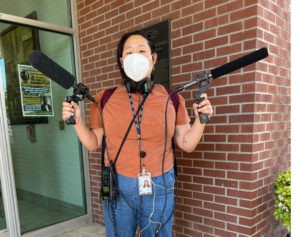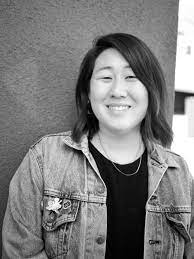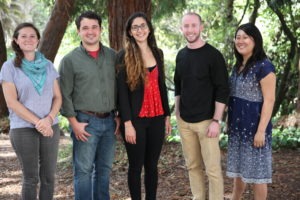For Alyssa Jeong Perry (’16), the recent wave of anti-Asian violence has underscored the need to report on the diversity within the Asian American community.
Perry, who is Korean American, is a producer at National Public Radio’s “Code Switch” podcast, where she feels fortunate to be able to report deeply on issues of race, ethnic and cultural identity.
“There are so many different cultures and immigration stories, even a hierarchy of racism, among Asians,” Perry said. “You can’t just dump the title ‘Asian American’ on them and expect everyone to have the same reaction.”
Before landing a job at Code Switch, Perry was a health reporter at KPCC in Southern California and a producer/reporter at KQED in San Francisco, where she uncovered that Tesla had undercounted its factory workers’ injuries to the government. That investigation, co-reported with “Reveal” at the Center for Investigative Reporting, won the 2018 Investigative Reporters and Editors Radio Award, among other honors.
We caught up with Perry recently and asked her about her job at Code Switch, her passion for audio journalism, and the surge of attacks on Asians across the country:

Perry reporting in the field for NPR’s “Code Switch”
What’s it like to be a podcast producer at NPR’s Code Switch?
I know it might sound cliché, but it’s a dream job for me. I work with a small but mighty team that pushes out content on a weekly basis. My schedule is different every day. Sometimes, I’m reporting a story out, which means I’m out in the field (not a lot these days due to the pandemic) or I’m writing and interviewing. Other times, I’m assisting the hosts and helping to push out the next or future episodes. Those tasks range from setting up interviews, interviewing, cutting tape and actually mixing the episode.
What drew you to radio and what keeps you in this medium?
I really love long-form storytelling. Originally, I thought I wanted to do documentary or magazine writing. I loved Ed Dobb’s narrative writing classes but realized my talent wasn’t in magazine writing. I have listened to audio stories since I was a child (yes, I listened to audio books on cassette like “The Lion, the Witch and the Wardrobe,” etc.), so already I loved the art of sound. When I realized you can combine reporting, narrative, and storytelling, I was sold.
There really are no rules in audio — meaning there is no set way to tell a story. Once you nail down the fundamentals, you can really be free to your own devices. You can be really creative with the way you use sound and structure a story in a way that I find limited in other formats. Also, there’s something so intimate about telling a story by using just sound in someone’s ears. It can really evoke a lot of emotion, which is important to me.
 As a Korean American journalist working on a podcast about race and identity in America, what are your thoughts about the recent spate of attacks on Asians in the U.S. and the media coverage?
As a Korean American journalist working on a podcast about race and identity in America, what are your thoughts about the recent spate of attacks on Asians in the U.S. and the media coverage?
The recent uptick in hate incidents reported against Asians really affected me personally. I was scared because it felt so close to home. To me, I was frustrated a bit with the media because it seems to have only covered attacks on Asians as isolated events rather than really giving a lot of context to why there is so much built up racism against Asians, which includes the U.S. wars in different Asian countries, the Chinese Exclusion Act of 1862, etc. It’s easier to just report what is in front of you, but something so complex like race and white supremacy really needs context and thoughtfulness — and a diverse newsroom. I am really lucky that we have the opportunity to pull the curtain back at Code Switch. Right after the shootings, we were able to push out an episode quickly after the shootings in Atlanta to help give some context to this complex issue.
What is one lesson that you learned at Berkeley Journalism that you find yourself using on a regular basis?
I really took a lot from the audio classes in terms of production. But I really learned so much about reporting in Ed Dobb’s class. He always taught us to timeline your reporting and stories. That way you can see how the story unfolds and you can find the holes in your reporting. Also, once you have that down, you can start to restructure the story in any medium in a more compelling way.

Perry (far right) with the other IRP Mark Felt Scholars: Parker Yesko, Jimmy Tobias, Nadine Sebai & Brett Murphy from the class of ’16
You were a Mark Felt Scholar at Berkeley Journalism’s Investigative Reporting Program, which gave you funds to do a deep dive into one story. How did this experience influence your career?
I used that money to report on an immigration loophole that has left overseas-born adoptees without citizenship in the U.S. That means if you were born in a different country and adopted to the U.S. before 2001, you don’t get automatic citizenship and could be left vulnerable for deportation. The scholarship allowed me to travel to Korea to meet deported adoptees and dig deeper into why this is the problem. Why weren’t adoption agencies held responsible and who is at fault for this? And how can we fix this issue? The story ran as a feature in The Nation and really helped me win awards and legitimize my career as a reporter. I’m forever grateful for that opportunity because it’s rare to get the chance to report abroad these days, especially as someone who is green to journalism.
How did you end up working on the award-winning investigative story about Tesla’s safety practices so soon after you graduated from Berkeley Journalism? How did this story change the trajectory of your career?
I was working as an on-call reporter and producer at KQED shortly after I graduated. I was doing some daily news spots on Tesla and these worker injuries that were happening out of the Fremont factory. They were repetitive. One of the editors at the time, Queena Kim (Berkeley Journalism audio lecturer and alum), encouraged me to keep reporting on this. A source told me to pull the injury records from Cal OSHA, so thankfully, KQED helped with the cost of that. Then, they pitched it to Reveal. I was really lucky to work with veteran investigative reporter Will Evans, who was able to find some really damning information that the company was fudging their worker injury rates to look better. I worked on the audio portion of the story and that really helped me gain the experience to get the job I’m in today.
By Janice Hui
